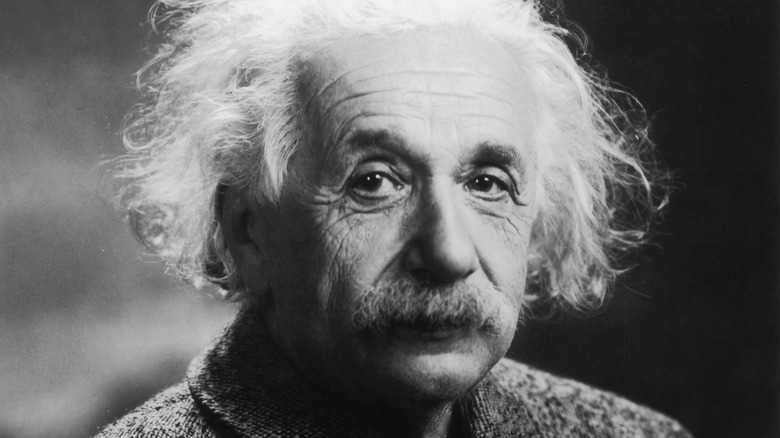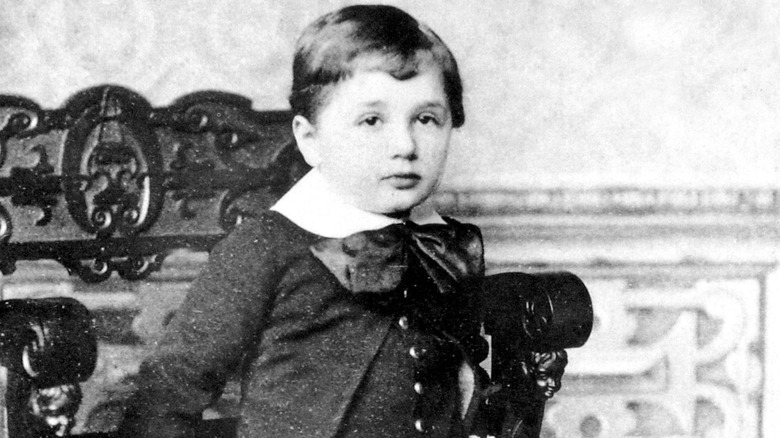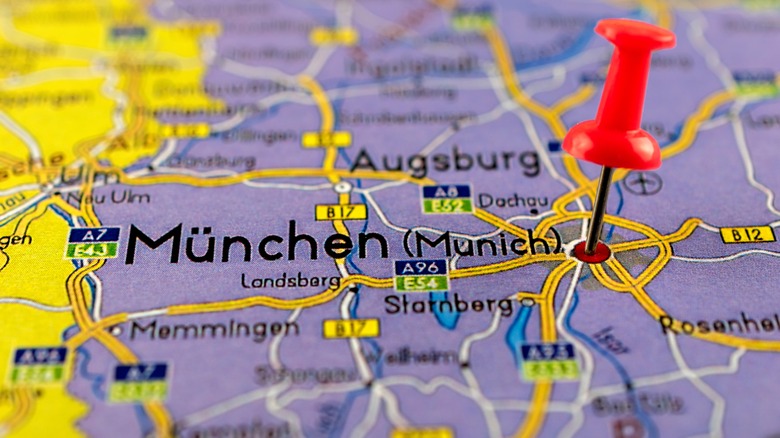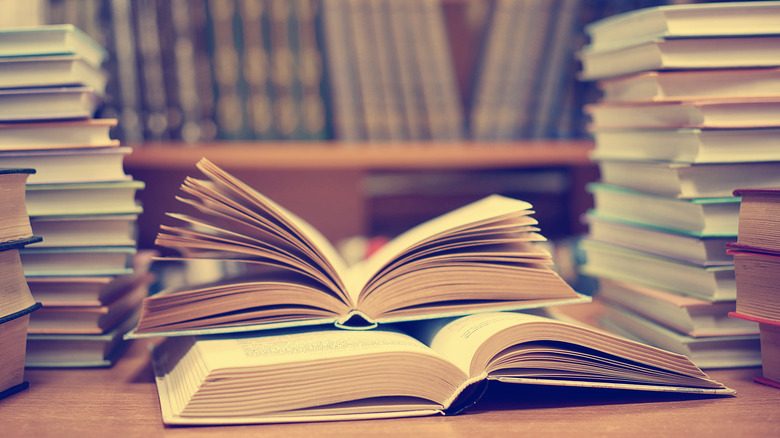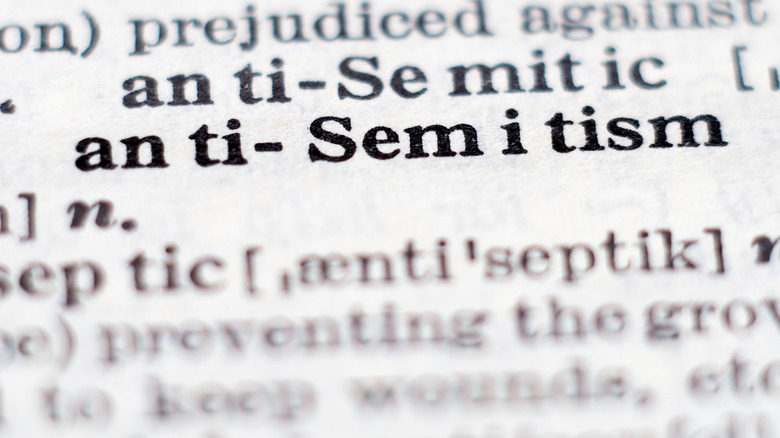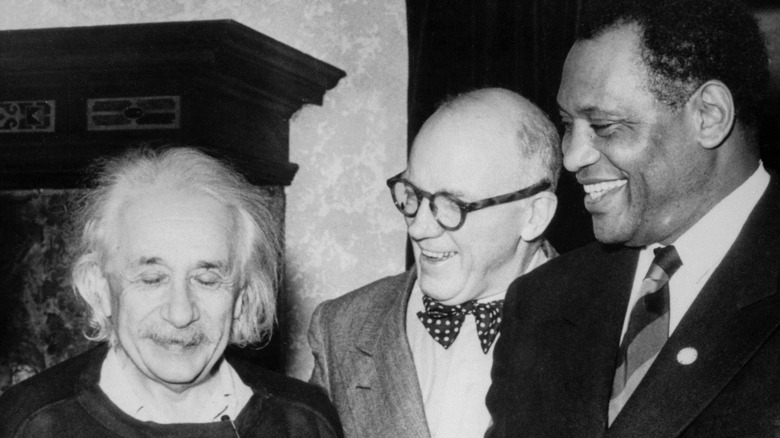Inside Albert Einstein's Tragic Childhood
Albert Einstein is one of the most famous scientists in history and changed how we understand the universe and time through his work. But before he became a Nobel Prize-winning physicist, his life wasn't an easy one. Einstein was born on March 14, 1879, in Ulm, Germany, and experienced early difficulties with speech, according to Biography.
During Einstein's childhood, his father's businesses struggled to stay afloat, and he was separated from his family during his schooling. In the 1890s, he remained behind to finish elementary school when the rest of his family moved to Italy. Einstein experienced antisemitism and isolation while in school and detested the rigid Germanic teaching system. He left secondary school in Munich before graduating. "Active attacks and verbal abuse on the way to and from school were frequent but usually not all that serious," Einstein told a newspaper editor in 1920 (via "The Ultimate Quotable Einstein"). "They sufficed, however, to establish an acute feeling of alienation already in childhood."
Early learning difficulties
As a small child, Albert Einstein was slow to begin speaking. According to "American Sketches: Great Leaders, Creative Thinkers, and Heroes of a Hurricane," the issue worried his parents enough that they consulted a specialist. When he finally began to talk, he acquired an unusual habit. "Every sentence he uttered, no matter how routine, he repeated to himself softly, moving his lips," his sister, Maria Einstein, known as Maja, wrote in a biographical sketch of her brother (via "The Collected Papers of Albert Einstein: The early years, 1879-1902"). "This odd habit persisted until his seventh year."
The family maid nicknamed Albert "der depperte" (the dopey one) because of this eccentricity. He also balked at his parents' first attempt at formally educating him. When he was 5, a teacher came to the house. Albert, who was prone to violent temper tantrums as a small child, threw a chair at the woman, who "was so frightened that she ran away terrified and was never seen again," Maja recounted.
Shaky family finances
When Albert was 2 years old, Albert Einstein's father, Hermann, moved the family from Ulm to Munich to build a plumbing and electrical business with his brother Jakob. According to Albert's sister, Maria Einstein, the venture turned out to be financially disastrous. "It is hard to say why it never really flourished. ... [I]n short, business affairs grew progressively worse," she wrote (via "The Collected Papers of Albert Einstein"). The somewhat mercurial Jakob convinced his brother Hermann to move the business to Italy in 1894, again uprooting Albert and his little sister Maja, who loved their homelife in Munich.
While the rest of the family decamped to Italy, Albert, by then in his early teens, was forced to stay behind to continue his studies while living as a boarder. The business didn't fare much better in Italy, and their financial difficulties continued to mount. Young Albert felt the burden of his family's precarious financial circumstances while attending college in Switzerland in 1898. "What oppresses me most ... is the misfortune of my poor parents," he wrote to his sister (via "Albert Einstein, The Human Side: Glimpses from His Archives"). "I am nothing but a burden to my family. ... Really, it would have been better if I had never been born," he added.
Problems at school
Albert Einstein was a good student and made high grades, but he balked at the rigid system of his secondary school in Munich, per "Einstein: His Space and Times." The teachers weren't interested in their students' creative natures and taught through rote memorization. "The style of teaching in most subjects was repugnant to him; moreover, his home room teacher did not seem very well disposed toward him," his sister recalled in her biographical sketch. "The military tone of the school, the systematic training in the worship of authority that was supposed to accustom pupils at an early age to military discipline, was also particularly unpleasant for the boy."
She said one of Einstein's teachers at the school felt "nothing good will ever come of him." Because of Einstein's aversion to the school's methods and the prospect of mandatory military service when he turned 16, he dropped out of school and joined his parents in Italy, according to Britannica. After failing his entrance exams in several subjects (he did well in the math and physics sections) for the Swiss Federal Institute of Technology, he agreed to finish his final year of high school education in Switzerland. At 17, the university admitted him, but he butted heads with several of his professors there as well, per History.
Antisemitism
In Munich, Albert Einstein attended a Catholic school, and as a quiet loner with good grades, his schoolmates bullied him because he was Jewish, according to "Einstein: His Space and Times." Einstein would later recall one particularly uncomfortable moment in class during elementary school when the priest in charge of their religious studies brought in a large nail to demonstrate how Jesus had been crucified. In one retelling of the incident, the priest specifically added that the crucifixion came at the hands of the Jews, per "Einstein's Religiosity and the Role of Religion in His Private Life." At the end of the lesson, all the other students were staring at Einstein.
"Among the children, anti-Semitism was alive, especially in elementary school," he recalled (via "The Ultimate Quotable Einstein"). "It was based on conspicuous racial characteristics and on impressions left from the lessons on religion." The experience stuck with him into adulthood when he was again subjected by the Nazis to similar attacks and worse (they put a price on his head) in the 1930s.
Into adulthood
Albert Einstein's traumatic childhood experiences colored his later life, in many ways for the better. The antisemitism he faced as a child in tandem with the rise of Nazism pushed the physicist to become an outspoken critic of racism, according to "Einstein on Race and Racism." In 1931, he wrote an article calling out American racism for The Crisis magazine, the brainchild of writer and civil rights activist W.E.B. Du Bois. When Einstein moved to Princeton, New Jersey, a few years later, he befriended several prominent Black Americans, including the folk singer Paul Roberson and Marian Anderson, the opera singer, per Princeton Magazine.
Einstein's negative experiences with the German education system also influenced him in adulthood. With his platform as a preeminent thinker, he often spoke out about the importance of creativity over dogmatic education. "Imagination is more important than knowledge," he told an interviewer in 1929 (via "The Ultimate Quotable Einstein"). "Knowledge is limited. Imagination encircles the world."
